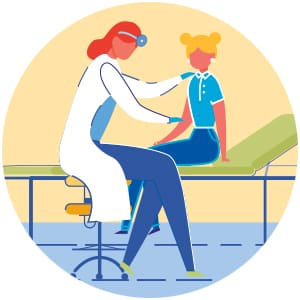
Gut check
Addressing weight issues in children through new habits
Obesity in children was a documented issue in the United States before the pandemic, and physicians are reporting an increase during the pandemic as well, with studies finding “significant weight gain,” especially in younger children between 5 and 11.
Defining the problem
Obesity is a complex disease, influenced by many things, including biology (genetics, risk for disease development); psychological (mental health of patient and family, emotional support) and social factors, including the environment (sidewalks, parks, green spaces, safety); access to health care; and affordable healthy food options.
Learned behavior plays a role too. Overfeeding or giving a child food as a reward when they cry or are sad or do something well can contribute to obesity. “Limited physical activity, increased sedentary time and poor sleep are also known to influence the development of obesity,” explains Dr. Sharonda Alston Taylor, a pediatrician at Baylor College of Medicine and Texas Children’s Hospital in Houston.
Steps to take
First, see your pediatrician, general practitioner or family doctor, who will measure your child’s body mass index (BMI) and review their growth pattern.
Once the doctor diagnoses a child as overweight or obese, they screen for related medical conditions like diabetes, high cholesterol, hypertension and non-alcoholic fatty liver disease.
The doctor will ask about the mother’s health during pregnancy, plus the child’s eating and exercise habits, as well as review child and family medical histories and the amount of non-school screen time.
Dr. Elizabeth Parks Prout, medical director of the adolescent bariatrics program at Children’s Hospital of Philadelphia, says the doctor will also ask about the child’s eating speed, hunger, boredom and nighttime eating behaviors and any “food sneaking and/ or hiding behaviors.” The physician may also assess the family’s mental health and social history, Taylor adds.
A treatment plan
Taylor says treatment plans provide a road map for making changes (see “What to ask the doctor”). Behavioral changes and developing healthy habits are as important as diet. “Treatment plans are more than the number on the scale, and include strategies for improving day-to-day functioning,” she says.
An effective treatment need not be complex. “Several simple changes incorporated over time will help most families,” Taylor says. These changes may include limiting calorie-containing beverages, limiting the second or third helping of food to vegetables only or getting more physical activity.
“A treatment plan driven by the family with small, specific, measurable, attainable, realistic and timely goals is critical,” Prout adds. If you, your child and the rest of the family drive the goals, everyone is more likely to stay motivated.
Get involved
Ask your doctor for help with specific goals and behaviors.
“Eat less and exercise more is not a specific plan,” Taylor says. “If your child ‘hates vegetables,’ a goal can be trying two new vegetables per week for four weeks or trying one new vegetable three different ways in the next two weeks. New habits take several months to develop, but reassessing progress every few weeks builds momentum.”.
Prout suggests parents examine the child’s social environments to see if there are areas in eating, exercise, screen time or sleep that can be modified. Work on developing a regular sleep schedule for your child without screens, and make time for daily active play for younger children and weekly exercise as a family.
“Obesity management is a marathon,” Taylor cautions. “It can take months to establish new habits. Focus on building healthy habits that can be maintained and praise those efforts.”

Support. How can I support my child and be a better role model of health? How can our family support the changes?
Medical concerns. Is my child experiencing medical or mental health problems that may be weight related? Do we need any additional screening tests?
Treatment plan. How do we start? Do we need to see other specialists? How often should we follow up with you?
Treatment goals. goals. Should my still-growing child be gaining, maintaining or losing weight?—DLM



